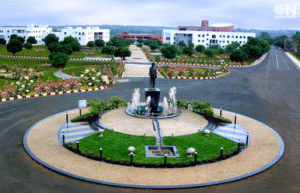New Delhi: Gujarat Power Corporation Ltd (GPCL) is actively engaged in a multitude of projects and initiatives aimed at bolstering the energy landscape in the state. With a strong focus on clean and sustainable energy, GPCL has implemented strategic measures to promote renewable sources, contributing to Gujarat’s energy security. The corporation is addressing challenges prevalent in the power sector through innovative solutions and proactive measures.
Embracing the evolving role of technology, GPCL is at the forefront of integrating technological advancements into its operations, ensuring efficiency, reliability, and sustainability in the rapidly transforming power sector. Through a combination of progressive initiatives and technological integration, GPCL stands as a key player in shaping Gujarat’s power future. In this regard, Shivani Babbar, ObserveNow, interacted with Arun Mahesh Babu, IAS, Managing Director, Gujarat Power Corporation Ltd.
Here are a few excerpts from the interview:
What strategies have Gujarat Power Corporation Ltd adopted to promote clean and sustainable energy in the state?
Gujarat has focused on a multi-prone strategy varying from setting up large-scale Solar Park to microgrids, and small solarization projects like the Modhera Solarization Project. GPCL has always adopted a strategy to explore new avenues of Renewable energy generation technologies like -the adoption of Offshore RE Windmill projects and green hydrogen projects in the state.
To encourage the large investment, GPCL has adopted a strategy to invite private sector participation through a Memorandum of Understanding at the Global Vibrant Summit 2024.
The government of Gujarat has signed multiple MoUs for the proposed investment of INR 3,19,000 Crore in the field of Green Hydrogen. We aim to make Gujarat a preferred destination for green hydrogen and derivatives production and exports with a target of 10,000 tons per annum (TPA) green hydrogen production capacity by 2025 with the potential to reach 1 million tons per annum (MTPA) capacity by 2030 to support India’s ambition of becoming energy independent by 2047.
How has the corporation been addressing the challenges associated with the power sector, and what innovative solutions have been implemented?
The critical issue on Renewable sector requirements is that they are land-intensive projects where we require a huge chunk of land, so the challenge for GPCL is to identify such wasteland which is neither used for agriculture nor industrial purposes as well. Such challenges are being addressed through scientific studies carried out through satellite applications and studies on the ground level after taking data from various districts. GPCL has successfully identified more than 5 Lakh hectares of wasteland in the state.
GPCL is also encountering challenges in implementing new and innovative projects where we have come across technological and regulatory aspects etc. GPCL has taken a coordinated approach with concerned regulatory authorities to resolve it accordingly. The success story lies in the commissioning of solarization of Modhera Sun Temple & Town with a 6 MW connected mounted Solar PV Power Plant where GPCL has shown the way for round-the-clock renewable energy to rural areas with a mixture of solar technology with Roof-top Solar application and energy storage system through Battery based Energy Storage System (BESS) Technology.
How do you see the role of technology evolving in the power sector, and what steps is the corporation taking to embrace technological advancements?
Evolving technology is playing a pivotal role in the power sector, especially in the Renewable energy sector. The basic characteristic of Renewable energy is characterized by its irregularity, inconsistency, and unpredictability. Hence our major challenge is to find new RE generation technologies that are dependable, consistent, and provide round-the-clock power generation at affordable rates.
Apart from that, at GPCL, we are Leveraging AI (Artificial Intelligence) and IoT (Internet of Things) to enhance the efficiency and reliability of Renewable energy distribution in the state. We have already started deploying IoT sensors across the power grid to monitor and collect data on voltage, current, power quality, and other relevant parameters. We are establishing a robust data collection and management system to handle the massive amounts of data generated by IoT sensors and other devices. We aim to make the grid dynamically adjust voltage levels, rerouting power, and have a proper load balancer.
What collaborative initiatives or partnerships has Gujarat Power Corporation Ltd established, both at the national and international levels, to enhance the power infrastructure and expertise?
GPCL is closely working with the Ministry of Renewable Energy and leading institutes like the National Institute of Mine Energy (NIME). GPCL is also connected with the Indian Institute of Technology- Bombay, Indian Institute of Technology- Gandhinagar, Shakti Foundation, CEEW, and so on. Apart from that GPCL is planning to spread its partnership with International Institutes such as USAID and UC Berkeley as well.
What measures is Gujarat Power Corporation Ltd taking to promote transparency, accountability, and good governance in its operations?
Promoting transparency, accountability, and good governance in the operations of GPCL, is crucial for building trust with stakeholders and ensuring the company operates ethically. We provide regular and comprehensive reports on financial performance, operational metrics, and sustainability initiatives, ensuring transparent accounting practices and financial reporting in compliance with relevant regulations & conducting regular independent audits of financial records to ensure compliance and accuracy.
We at GPCL, leverage technology for transparent and efficient operations, such as implementing smart grid technologies and real-time monitoring systems, and invest in training programs for employees to enhance their skills and knowledge about compliance, governance, and ethical practices.
Can you provide an overview of the current projects and initiatives that Gujarat Power Corporation Ltd is involved in?
Gujarat has unveiled its renewable energy policy focusing on leveraging the state’s potential of 36 GW of solar and 143 GW of wind capacity to enable a cost-effective and reliable power supply. Since the beginning of the Renewable Era in 2009, GPCL, as designated Nodal agency for solar and other renewable energy by the Government of Gujarat is leading from the front and is well committed to achieving the Hon’ble Prime Minister’s objectives to fight climate change and mitigating to Zero Carbon Emissions by 2070.
In 2009, having few KWs off-grid RE, now the State’s Renewable power generation capacity stands at 22,435 MW as of today, to become a global hub for the Renewable Power sector and has laid out an ambitious plan for hydrogen manufacturing in the State. Out of total installed power generation, approximately 46.24 % is Renewable Energy which makes ~12.5% of India’s total Installed Renewable Energy capacity (including large hydro).
GPCL was a pioneer in setting up Asia’s biggest and first ever Solar Park in Charanka at a single location with a capacity of 215MW in 2011 and currently expanding to 730 MW. This park has become the flex of India’s national mission for setting up large-scale solar parks in the country. This integrated “Charanka Solar Park” has spread in 5384 acres of land, and state-of-the-art infrastructure with provision to harness rainwater besides power evacuation at the doorsteps. As of now 730 MW Solar Projects have been commissioned by 36 developers. Further, projects of 20 MW power capacities are under implementation. Solar Park also can generate 4.2 MW of Wind Power and already two Windmills, each of 2.1 MW have been commissioned to make the Park.
Apart from the above, GPCL has successfully commissioned the following parks and innovative RE Projects:
Dholera Ultra Mega Solar Park (UMSP): It is fully owned by the Dholera Special Investment Region Authority with a Total Capacity of 1000 MW in Phase-1, In Phase-2 the project aims to expand to an impressive 4,000 MW with a procurement agreement in place with SECI. This park is set up in the coastal area in the Gulf of Khambat.
Raghanesda Solar Park: It is a 700+ MW Ultra Mega Solar Power Project (UMSPP) on government wasteland having an area of about 1,392 hectares at village- Raghanesda, District- Banaskantha. At present total of 600 MW Solar Power Projects commissioned, and 100 MW work is under progress. This park is set up on 100% wasteland near the desert area.
Modhera Sun Temple and Town: The outcomes of the Modhera solarization project are truly impressive, with the Hon’ble Prime Minister recognizing Modhera as “India’s First 24 X 7 Solar Powered and BESS based Village Modhera – Suryagram.” The village’s ability to export surplus green energy and generate revenue demonstrates the project’s success in promoting clean energy and its financial viability. The Modhera Sun Temple, a cultural and historical treasure, now stands as a symbol of modern sustainability with free solar power. This project serves as a beacon of hope and inspiration, showcasing the potential of solar energy storage technology, electric vehicle charging stations, and smart demand response systems.
30 GW RE Park, Khavda, Kachchh: Now GPCL is instrumental to set-up World Biggest RE Park at Khavda in Kutch, with expected Renewable power generation capacity of 30GW by December 2026, this will be first of its kind park known as “30GW Khavda RE Park” which will have multiple energy generation sources mainly Wind, Solar and in future, it will be equipped with Battery Based Energy Storage systems (BESS). Under Govt waste land policy, a large-scale land is identified, near the International Border in Kutch district. Approx. 72,400 hectares of land for 27,700 MW RE capacity has been allotted to 6 Developers.
Offshore Wind Power Projects: GPCL has planned futuristic offshore wind energy development as a significant step towards Gujarat’s commitment to clean energy and India’s goal of achieving 500 GW of renewable energy capacity by 2030. GPCL will play a pivotal role in facilitating offshore wind development, coordinating with national agencies, and serving as a central point of contact. The successful completion of the initial study near port of Pipavav, highlighting its 36 GW offshore wind potential, further solidifies Gujarat’s position as a key hub for renewable energy in India.
Nearshore wind Project: A pioneering Near Shore Wind Project with a capacity of 10-50 MW, strategically located within 1000 meters from the beautiful seashores of Dist. Bhavnagar is also planned. This visionary project demonstrates our commitment to sustainable energy generation, environmental stewardship, and technological innovation. GPCL’s Near Shore Wind Project not only harnesses the power of the wind to generate clean electricity but also showcases our dedication to setting new standards in offshore energy generation.




















